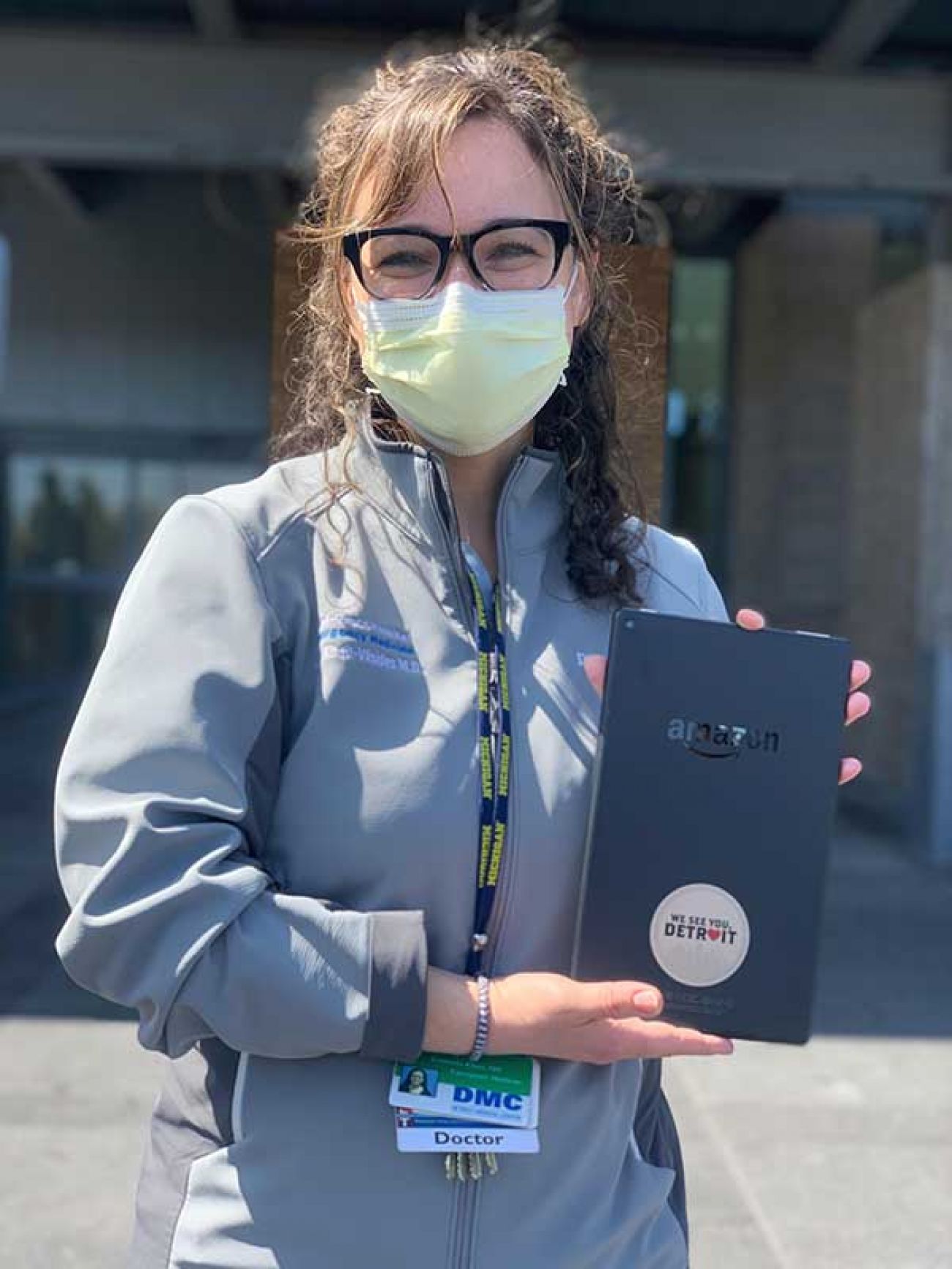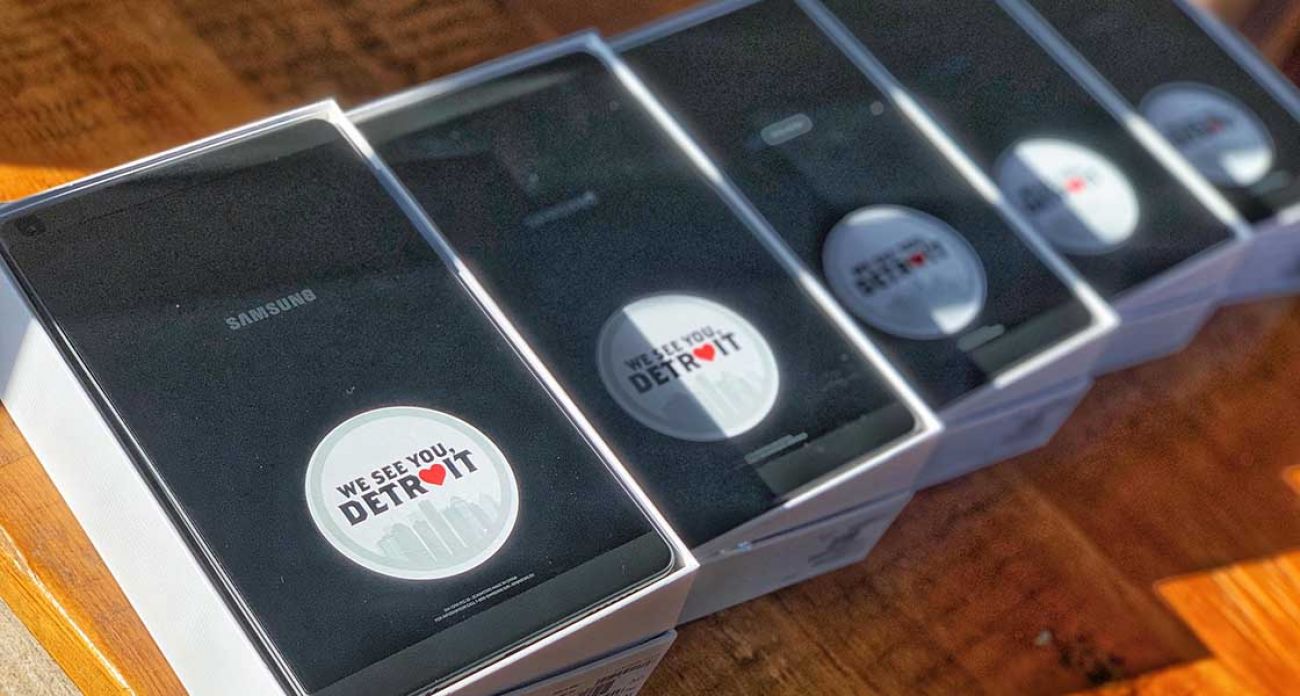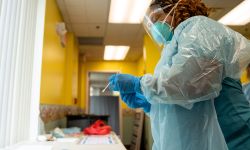After her patients died alone, Detroit doctor raises money for tablets
Dr. Luda Khait-Vlisides had to look through her patient’s phone to find his daughter’s number, so she could tell her her father had died.

The patient, a man who’d come into the emergency room at Detroit Medical Center Sinai-Grace during the COVID-19 surge with severe shortness of breath, was waiting for a bed to open up in the Intensive Care Unit. Dr. Khait-Vlisides knew they needed to get him on a ventilator, fast.
But first, they gave him a moment to call his daughter.
“If we're going to put somebody on life support, we'd like them to talk to their families before we do that,” Khait-Vlisides said. “And so he was able to speak with his daughter over the phone. And I actually couldn't listen to that conversation. I had to step out, because I just couldn't listen to it.”
But even with the ventilator, the man deteriorated quickly, she said, and died. “We just felt so helpless,” she said. “We did everything that we could and everything that we normally would do was just not good enough. And I lost it that day.”
So Dr. Khait-Vlisides looked through the man’s phone to find the number he’d just called: his daughter’s.
- The latest: Michigan coronavirus map, locations, updated COVID-19 news
- What Michigan's new coronavirus stay-at-home executive order means
- Can you buy seeds in Michigan? Confusion reigns over Whitmer stay-home order.
- When Michigan unemployment, stimulus checks, and $600 CARES money will arrive
“This was very shortly after she’d talked to him,” she said. “I spent half an hour on the phone with her in the back hallway, crying together. Normally we have these conversations, good and bad, whatever conversations it is – in the family room [in the hospital].... And I couldn't do that. And it just broke my heart. The family member was alone at home and had really no immediate support around her.”
A plea for help
Other hospitals were already using tablets to allow patients to call and video chat with family members who couldn’t visit under the COVID-era restrictions.
“And I thought, this is something that we actually need,” Khait-Vlisides said. “Some of our patients may not have an iPhone or an Android phone, where they have the capability to talk to their family members through, you know, by seeing them.”
So on April 5, she put out a plea on Facebook:
Two days later, a friend of a friend who’d seen her Facebook post started collecting donations on GoFundMe. The page was shared widely by healthcare workers in the area, asking their own friends and family members to help out.
Stories from the front
Bridge Magazine, Detroit Free Press and Michigan Radio are teaming up to report on Michigan hospitals during the coronavirus pandemic. We will be sharing accounts of the challenges doctors, nurses and other hospital personnel face as they work to treat patients and save lives. If you work in a Michigan hospital, we would love to hear from you. You can contact reporters Robin Erb rerb@bridgemi.com at Bridge, Kristen Jordan Shamus kshamus@freepress.com at the Free Press and Kate Wells katwells@umich.edu at Michigan Radio.
So far, 123 donors have raised more than $12,000. Comcast donated 30 tablets. And individuals started in sending their used tablets, as well. Khait-Vlisides said one of them has already been used to let a patient in the ICU say goodbye to family members “all across Michigan and across the country.
“They were able to see their loved ones in the hospital, and actually see what the patient looked like. And they were able to have those difficult conversations that we normally would have face to face. And although it was, you know, very, very emotional for everybody, obviously, I think I think the families are very appreciative to the fact that they were able to see their loved one, and were able to kind of see the emotional expression of the physicians and the team taking care of their family member.”

A larger shipment of tablets was delivered to DMC this week, and Khait-Vlisides and her team have started distributing them to the surgical Intensive Care Unit at Sinai Grace. “We’ll be getting them to the medical ICU shortly as well,” she said via text. “There are a lot of patients that can benefit from this type of communication, both covid and not covid [sic.]”
Working with the donors, organizers, and volunteers who’ve stepped in to make this possible, has given Khait-Vlisides “a glimmer of hope,” she said.
“When this whole thing started, I don't think anybody could have prepared [for] the atrocities that you see [in the hospital.] What I saw, I wouldn't wish upon my worst enemy ... you just feel so helpless and just defeated.
“And being able to do something like this, I think gives me a little bit of a glimmer of hope that as a team, we will be OK. Our population will be OK. Detroit will be OK.”
RESOURCES:
- Hey, Michigan, here’s how to make a face mask to fight coronavirus
- Michigan coronavirus dashboard: cases, deaths and maps
- Michigan families can get food, cash, internet during coronavirus crisis
- How to give blood in Michigan during the coronavirus crisis
- 10 ways you can help Michigan hospital workers right now
- Michigan coronavirus Q&A: Reader questions answered
- How to apply for Michigan unemployment benefits amid coronavirus crisis
See what new members are saying about why they donated to Bridge Michigan:
- “In order for this information to be accurate and unbiased it must be underwritten by its readers, not by special interests.” - Larry S.
- “Not many other media sources report on the topics Bridge does.” - Susan B.
- “Your journalism is outstanding and rare these days.” - Mark S.
If you want to ensure the future of nonpartisan, nonprofit Michigan journalism, please become a member today. You, too, will be asked why you donated and maybe we'll feature your quote next time!





